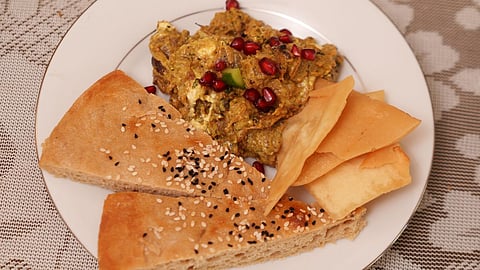
- LIFESTYLE
- FASHION
- FOOD
- ENTERTAINMENT
- EVENTS
- CULTURE
- VIDEOS
- WEB STORIES
- GALLERIES
- GADGETS
- CAR & BIKE
- SOCIETY
- TRAVEL
- NORTH EAST
- INDULGE CONNECT

Tender and juicy prawns, slow-braised in rich creamy herb sauce paired with light and fragrant rice, pomegranate, kale and tomato is nothing short of a delightful gastronomical journey through flavours, textures and history.
A stand-out dish created by the Persian Chef Nasrin Karimi, the Shiraz prawn is part of the main course of the Taste of Persia, a curated celebration of an ancient cuisine, ongoing at the Roastown restaurant in Kochi.
“The new Chef’s studio at Roastown aims to bring in celebrity chefs from all over the world over the next few months. Chef Nasrin Karimi will be the first of the series,” said Annette Jojo, director at Roastown Global Grill.
If you are someone who would like to learn the incredible art of balancing flavours like the sweet and the tart, or a balance of textures so typical of Iranian cuisine, Chef Nasrin Karimi will be demonstrating live cooking with interactive sessions on September 28 noon. Or if you are a food enthusiast exploring cuisines and looking to tantalise your taste buds, the chef will be serving a delectable five course meal on September 27 and 28 for dinner and on September 29 for lunch at Roastown.
Nasrin Karimi, who hails from the Shiraz town in Iran, says her town is blessed with a whole lot of fruits and nuts especially pomegranates, plums and walnuts. No wonder that you get to see crimson gems of pomegranate in every one of the 5-course dishes, except for the Koobideh meat kebabs that comes with a tangy minty dip, a salad, grilled tomatoes and a slice of lime.
The meal begins with Zeytoon Parvadeh, an appetizer that has olives with walnut and pomegranate. The combination is a delightful contrast, with the briny olives the tangy sweet pomegranates and the walnuts all tied together by a traditional sauce on a bed of lettuce.
The cold starter, Masto Bademjan, an eggplant dip served with whole wheat sourdough bread comes next. It is a dance of the textures - the bread and the creamy eggplant dip - rather than the flavours. But chef’s attention to detail, makes it addictive with each dip.
Nasrin Karimi says the cuisine in Iran also varies according to the season, where the ingredients change from fresh to dried fruits or vice versa. But what is forever missing from her dishes are preservatives and other chemical additives.
The hot starter, the Koobideh kebab, is probably made when the pomegranates are out of season; but it is a staple in most Iranian homes. Apart from the Shiraz Prawns, the Chicken Zereshk polo with moist and succulent meat, and served with saffron-infused rice forms the second half of the main course. Low on spices, this dish may seem a little too sweet for the Indian palate, especially since the rice is also mildly-flavoured. “I understand, I get it,” said Chef Karimi, serving a hot green chilli concoction herself, with a smile.
No Persian meal is complete without dessert and a tea to balance. The degustation dessert platter included Tar halva, a traditional pudding-like sweet, fragrant with saffron, the luxurious silky texture melting in the mouth.
This is followed by a crispy, crunchy Bamieh, which are churros with a glaze of cranberry sauce. Last but not the least is the Persian ice-cream, distinctly flavoured with rose water and the Persian sweet tea, which brings an elegant end to a lavish Persian feast.
Story by Reema Narendran